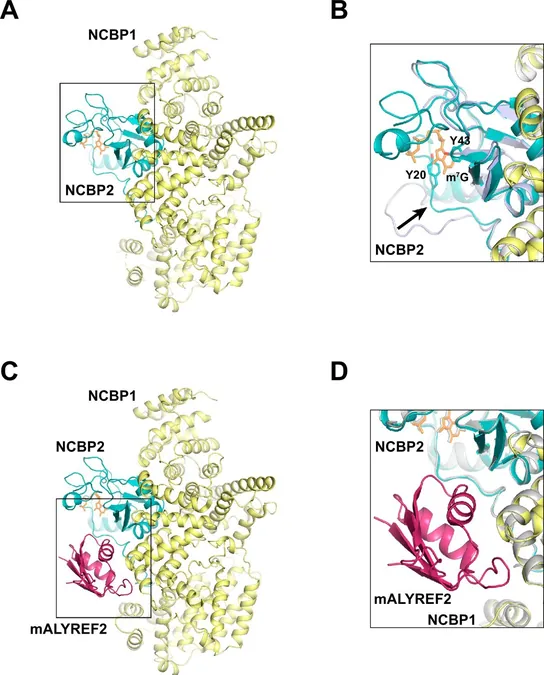
Shocking Findings: First Trimester Tetracycline Use NOT Linked to Major Congenital Malformations!
2024-11-22
Author: Rajesh
Groundbreaking Study Published in JAMA Network Open
In a groundbreaking study recently published in *JAMA Network Open*, researchers have determined that first trimester use of tetracyclines is not associated with an increased risk of major congenital malformations (MCMs) in newborns. This revelation could change the way bacterial infections are treated in pregnant women, dispelling longstanding fears surrounding the safety of tetracycline antibiotics during the crucial early stages of pregnancy.
Tetracyclines: A Common Treatment Option
Tetracyclines are a common choice for treating bacterial infections, particularly during the first trimester when many women are unaware of their pregnancy. Historically, these antibiotics have been avoided due to concerns about potential adverse effects on a baby's skeletal and dental development. Past studies, however, primarily focused on the effects of tetracycline exposure later in pregnancy, and the current research aims to fill this crucial knowledge gap.
Study Design and Methodology
To evaluate the relationship between first trimester tetracycline exposure and the risk of MCMs, the study analyzed data from singleton births in Sweden recorded between July 1, 2006, and December 31, 2018, using the comprehensive Medical Birth Register. The analysis excluded cases with known teratogen exposure, mothers not residing in Sweden, and those with incomplete gestational data, ensuring a robust study cohort.
Findings from a Substantial Dataset
Focusing on a substantial dataset of 1,245,889 infants, the researchers found that only 0.5% of mothers filled prescriptions for tetracyclines during the first trimester. Despite this small percentage, the findings were significant: among the 69,656 infants studied, those exposed to tetracyclines had a rate of MCMs of 39.75 per 1000, which was only slightly higher than the 38.76 per 1000 rate observed in unexposed infants. This discrepancy results in a relative risk (RR) of just 1.03, indicating no meaningful increase in risk.
Notable Exceptions in the Study
While the majority of MCM subgroups showed no increased risk from tetracycline exposure, the study did identify a noteworthy exception. There was a reported rise in the risk of nervous system and eye anomalies, with RRs of 1.92 and 1.76, respectively. Sensitivity analyses further corroborated these findings with heightened RRs of 2.64 for nervous system issues and 1.35 for eye anomalies. Infants exposed to tetracyclines exhibited a 1.6-fold increased risk of nervous system anomalies and a 1.5-fold increased risk of eye conditions compared to their unexposed peers.
Impact of Different Tetracycline Types
The researchers also investigated the impact of different types of tetracyclines. Their findings revealed varying risks associated with specific medications: doxycycline had a relative risk of 1.07, while lymecycline and tetracycline/oxytetracycline demonstrated lower risks of 0.83 and 0.78, respectively. Interestingly, the study noted that infants with short-term tetracycline use experienced increased rates of comorbidities and healthcare needs compared to those with long-term exposure.
Conclusions and Future Research
Overall, this extensive research reshapes the perspective on tetracycline use during the first trimester, suggesting that the historical fears over major congenital malformations may be unfounded. Nevertheless, the scientists emphasize the need for further studies to explore potential risks fully and establish guidelines for the safe use of tetracyclines in pregnant women.
Hope for Expectant Mothers
As medical practices evolve with this new data, expectant mothers can remain hopeful that effective treatment for bacterial infections can be managed without unnecessary fear. Stay tuned for more updates as researchers continue to investigate this important aspect of maternal health!



 Brasil (PT)
Brasil (PT)
 Canada (EN)
Canada (EN)
 Chile (ES)
Chile (ES)
 España (ES)
España (ES)
 France (FR)
France (FR)
 Hong Kong (EN)
Hong Kong (EN)
 Italia (IT)
Italia (IT)
 日本 (JA)
日本 (JA)
 Magyarország (HU)
Magyarország (HU)
 Norge (NO)
Norge (NO)
 Polska (PL)
Polska (PL)
 Schweiz (DE)
Schweiz (DE)
 Singapore (EN)
Singapore (EN)
 Sverige (SV)
Sverige (SV)
 Suomi (FI)
Suomi (FI)
 Türkiye (TR)
Türkiye (TR)